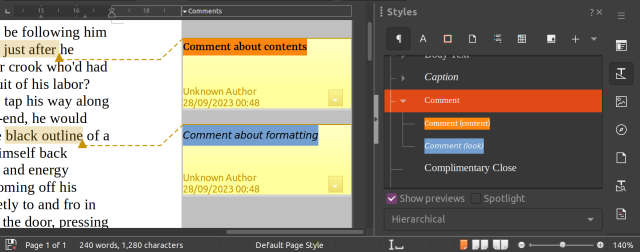#LibreOffice 24.2 will be our next major update, coming in February! 🎉 (New versioning scheme, to show the year and month when it's released.) A big new feature is styles for comments, added by Maxim Monastirsky: wiki.documentfoundation.org/Re… #foss #OpenSource
LibreOffice reshared this.

Nordnick 🐘
in reply to LibreOffice • • •LibreOffice
in reply to Nordnick 🐘 • • •Nordnick
in reply to LibreOffice • • •It's not the same... it is major.minor compared to year.month... the date of the release is telling nothing about the version.
Is 24.2 just a minor update (like 7.7) or a new major generation (like 8.0)?
LibreOffice
in reply to Nordnick • • •Nordnick
in reply to LibreOffice • • •Thanks for replying.
I like to have version numbers, that includes information to an engineer.
I don't like version numbers, that are just used for advertising purposes.
en.wikipedia.org/wiki/Software…
semver.org/
And btw. "mature"... does that mean, you will now switch to maintenance only?
Semantic Versioning 2.0.0
Tom Preston-Werner (Semantic Versioning)LibreOffice
in reply to Nordnick • • •Not maintenance – as mentioned, we'll have two big updates every year, with lots of new features, exactly the same as now. Nothing changes in the release engineering.
Re: the other point, it's not about advertising. Many people are using old versions of LibreOffice, and having a year+month version number (and communicating that well) can help. For the vast majority of end users, that year+month number says more than just some arbitrary thing that we choose. That's our view anyway 😊
Nordnick
in reply to LibreOffice • • •Two new generations a year?
This is a valid point... information to end users... but what about information to engineers and administrators? Something to offer both?
And hopefully, the version number was never "arbitrary"... it should tell me, that for example 7.6 is the seventh generation as seventh minor update (including six minor updates). Indicates also some maturity...
Btw.: I still have 6.4.x here... on a Linux LTS...
LibreOffice
in reply to Nordnick • • •Oh sure, it was never arbitrary for us – but for the vast majority of end users, who aren't familiar with release schedules, version numbering systems etc., "7.6" doesn't say much.
And you're right about keeping sysadmins and engineers in the loop, so any changes in those contexts will be clear in our announcements, release notes and other places. But please do let us know if we can improve something! 😊
Nordnick
in reply to LibreOffice • • •Funny... for me you start now with arbitrary numbers... 😉
What about using something like "Edition 2023, Version 7.6"?
And btw. i assume, it is possible to develop add-ons for #LibreOffice... how do they check a matching version? As something like "works with 7.x" (checking on major version 7 in the source code) would be no longer possible, right?
And are you sure, that end users will recognize 24.2 as February 2024? 😉
mkj
in reply to Nordnick • • •It also doesn't say anything about the degree of change I can expect as a user. If I upgrade from, say, 7.1 to 9.3, I know I can expect some fairly large changes. If I upgrade from 23.11 to 24.1 in a date-based versioning scheme? No idea. Maybe 23.11 was a maintenance release only fixing a security issue in 22.7, and 24.1 is a new major release?
Date-based version numbers might work for collections of software. For a single product, though, it quickly becomes confusing.
LibreOffice
in reply to mkj • • •Right, but the vast majority of our end users don't know what version numbers mean, so going from eg 7.1 to 9.3 doesn't say anything to them. Using year.month gives them a bit more context. We've done research and listened to our users, and many want this.
Of course, others won't be happy. Any time we make any change, some people are happy, some not. Version numbers don't just exist in a vacuum, and we'll provide more context about the degree of change in our announcements.
david petera
in reply to LibreOffice • • •LibreOffice
in reply to david petera • • •103064 – Introduce a comment style
bugs.documentfoundation.orgLibreOffice
Unknown parent • • •LucasVieites
in reply to LibreOffice • • •LibreOffice reshared this.
LibreOffice
Unknown parent • • •LibreOffice
Unknown parent • • •Trit’
in reply to LibreOffice • • •LibreOffice
in reply to Trit’ • • •